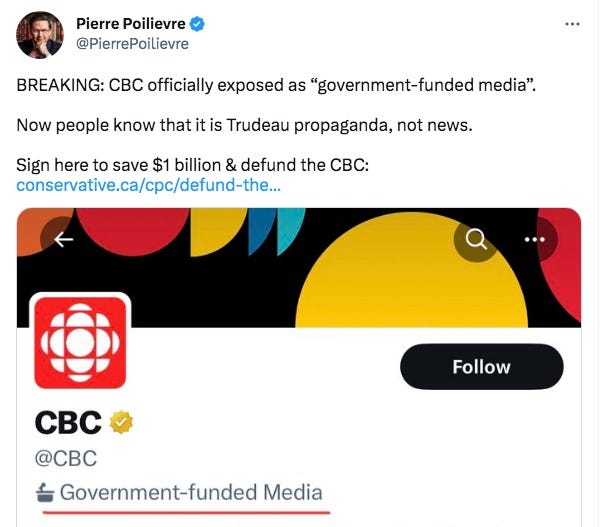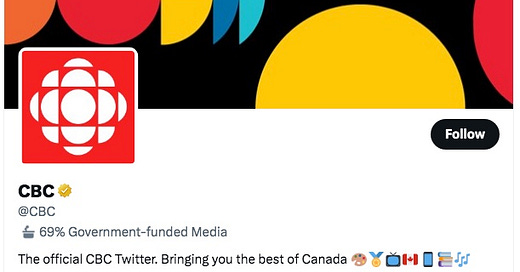CBC is wrong. So is Pierre Poilievre.
More than enough stupid to go around in case of CPC v. CBC v. Twitter
So, the CBC is upset that Twitter has labeled it a “government-funded media” organization. So upset, that it is withdrawing from Twitter – at least for now.
Conservative Party of Canada leader Pierre Poilievre immediately claimed credit for Twitter’s labelling because it happened after he had tweeted an open letter to Twitter owner Elon Musk calling for it.

This is a textbook example of the fallacy post hoc ergo propter hoc (after, therefore because) applied with political malice. Twitter was already in the process of labelling media outlets worldwide with similar label. See: NPR, BBC, etc.
In a schoolboy response to CBC’s protest that it was “less than 70% government funded,” Musk amended the CBC’s Twitter label to indicate it was “69% government funded.” Good fun, yes?
Twitter’s labels and policies have always been ad hoc and biased. Now, they’re downright whimsical and devil-may-care. But, that’s another post.
Who’s right and who’s wrong in this completely meaningless battle of hyperbole? Easy. They’re all wrong.
Everyone is wrong in this manufactured tempest
The CBC is a Government Funded Entity. That’s simply a fact. I wrote about it last year and proposed some ways to make the CBC better.
According to the CBC’s 2021-22 Annual Report, it received $1.14 Billion in federal government operating funding for that fiscal year. The federal taxpayer also provided $96.3 million for capital funding and $4.0 million for working capital. Total taxpayer subsidy: $1.24 Billion. This, against $651 million in “other revenues” that include advertising, subscriber and other fees.
Interestingly, the CBC’s coverage of the 2023 federal budget doesn’t mention how much government will spend on it. Admittedly, it’s not easy to tell right away, because the government’s budget PR material doesn’t really break down where money actually goes – it just shines a light on appropriately sparkly initiatives intended to elicit “oohs” and “ahhs” from the public. Still, it’s pretty routine journalistic practice for news organizations to inform their audiences when they have a fiduciary relationship with a subject of their reporting.
When radio station Newstalk 1010, (where I occasionally do paid commentary and fill-in hosting – see what I did there) covers stories about Bell Canada, announcers routinely mention “Bell is the parent company of this radio station” so listeners can assess for themselves how that may affect the coverage.
I point this out, because I also teach a Media Management course to first year students at the University of Guelph-Humber and almost none of them knew CBC received a billion-dollar-plus subsidy from Canadian taxpayers. When informed, none of them thought that was a good idea. So, it’s wrong for the CBC to assume (a) everyone is aware of their taxpayer-funded status and (b) they’re all supportive. They aren’t, and they aren’t.
The CBC is wrong
It’s silly for CBC to be upset about being labelled “government-funded.” For years, CBC mandarins and supporters have been arguing government funding does not affect the integrity of its journalism. Now, they’re arguing being labelled “government-funded” impugns the quality of their journalism – as if there’s something inherently wrong with government-funding. Which is it?
Either government-funded journalism is bad, or it isn’t. CBC needs to decide which argument it wants to make. It can’t, with any integrity, argue both.
The CBC is biased. That’s a fact. I know this because all media are biased – because all humans are inherently biased. What’s important is that we recognize and account for these biases.
Some news organizations in Canada have a conservative bias. Some have a liberal bias. Some of those organizations acknowledge their own biases and are transparent about them. Others pretend they are unbiased. They’re misleading their audiences. Those are the dangerous ones. CBC is one of these.
But CBC’s bias isn’t “pro-government.” The CBC wasn’t a right-leaning conservative propaganda fountain under the conservative governments of Stephen Harper or Brian Mulroney. Despite the fact, they received a fat taxpayer subsidy then too. So, it’s clearly not the money that’s producing the bias.
There are a lot of reasons a fat taxpayer subsidy is a problem – but it’s not causing the CBC’s bias. Therefore, it cannot see that its reportage and commentary is biased. Still not a problem, as long as there are alternative sources of news and information against which one can balance the CBC’s product. The CBC subsidy works against this counter-balance, as I’ll explain below.
Bias is ingrained in CBC’s mandate. Part of CBC’s founding mandate was to “Contribute to a shared national consciousness and identity.” To do this, one must first define the “Canadian identity.” So, CBC undertook to define what it means to be Canadian. This undertaking is founded on opinion, shaped with bias. Thus, the original sin of CBC’s fundamental bias, was enshrined in its world view. It’s inescapable.
As I’ve said before, bias isn’t a problem. It’s ubiquitous. Ignorance, or obfuscation, of bias is the problem. The CBC is institutionally unaware, or in denial, of its own bias.
Quitting Twitter is just stupid. A lot of Canadians - who pay for the CBC - get their news and information through Twitter. A lot of CBC journalists get much of their news and information, develop sources, check information and produce stories using Twitter. Quitting Twitter is a petulant, high school reaction by CBC management who are uncomfortable in their own skin. They need to grow up. They’re biased – we all are. They’re government-funded – we’d all like to be.
Pierre Poilievre is wrong
The leader of Canada’s Conservative Party wants to be Prime Minister of Canada. To accomplish this, he needs to keep raising tons of cash to spend on getting his message out and he needs tens of thousands of highly motivated volunteers to help him do that.
Bashing the CBC is popular sport for hardcore Conservatives – the kind of people who write cheques to the Party and volunteer to hand out flyers door-to-door – so any chance to beat up the CBC is good for Conservative Party business. Note that Poilievre’s “CBC is government-funded evil” tweets push people to a website designed to solicit donations and build a mailing list that will help identify supporters.
But, Poilievre’s claim that state-funding has turned CBC into Trudeau propagandists is demonstrably wrong. You may think they’re Trudeau trumpets, but the evidence demonstrates it is not because of the funding.

CBC broadcasts simply aren’t essential any more. The CBC was created in 1936 to provide a national news service for Canadians in an era when commercial broadcasting simply didn’t exist. In 2021, that is not the case. Private broadcasters provide arguably better, inarguably more popular news services. In fact, CBC’s English-language TV news products are not well watched by Canadians. French-language TV news may be a different story. I simply don’t know. CBC broadcasts are simply no longer required.
In radio, CBC provides a popular news service in some regions, less popular in others. However, there are a plethora of private radio stations that provide competing services, so the argument “CBC radio is essential” is simply false. The concept is anachronistic. In fact, radio of all types is facing a watershed moment as the penetration of high-speed broadband and satellite internet renders over-the-air radio broadcast technology near obsolete.
Some may enjoy their CBC radio programs and there is undoubtedly a market for them. But there is no necessity for them that would justify ongoing public subsidy beyond what other competing private broadcasters receive.
The CBC competes head-to-head with private broadcasters. CBC-TV and CBC-Radio compete head on with private broadcasters who do not receive a taxpayer subsidy of the kind that funds CBC. As a result of this unfair competition, private broadcasters suffer and are less able to produce and broadcast journalism and entertainment. CBC’s subsidy is harming Canadians’ access to competing Canadian content. That is anathema to CBC’s founding mandate.
I argue how to fix this in my January 2022 column.
Elon Musk and Twitter are wrong
Twitter’s policies have always been opaque and ad hoc, beholden to its own inconsistent and entirely obscured biases. Under Musk’s leadership, this has continued, with an element of schoolboy folly and impetuous maliciousness sprinkled on top.
I applaud Musk’s stated and apparent desire to make Twitter a more open and free-speech tolerant platform. This will require him bucking calls for the platform to “moderate” the expression of atypical opinions at every point along the political spectra.
But, his teenage toilet humour doesn’t help his cause. Responding to media inquiries with a “poop” emoji. Revising the CBC state-funding label to reflect “69% government funded” is the same. Not helpful.
Musk argues that if Twitter is going to label RT as “state-affiliated” media because it is under the editorial control of Russian president Vladimir Putin, so it should also label CBC, BBC and NPR as “state/public/government-funded” media. His reasoning is puerile. Why should Twitter label anything?
What do you think?





That's a very logical way to explain that both sides are wrong. Post hoc ergo hoc is a great point, Mark. With regard to Musk, I find his tongue in cheek tweets very amusing.